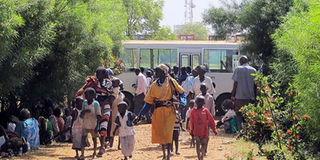At least 63 killed in South Sudan clashes

A handout photo released by the UNMISS on December 16, 2013 shows civilians seeking protection, arriving at the UNMISS compound adjacent to Juba International Airport on December 15 following recent fightings in the capital. At least 66 soldiers have been killed in battles raging for the past two days in the South Sudanese capital, a military hospital doctor said on December 17, 2013. AFP PHOTO / UNMISS / Rolla Hinedi
What you need to know:
- Sustained gunfire was still heard around the J1 presidential complex in what security officials said was a crackdown on the coup remnants probably hiding in the vicinity.
- The gunfire also included an onslaught on the house of the Inspector General of Police Pieng Deng Majok, where ex-ministers implicated in the attempted coup were detained, the officials said.
At least 63 people have been killed in clashes that followed an attempted coup in South Sudan's capital, Juba, medical and military officials said on Tuesday, as random shooting persisted.
Among the deceased were mostly soldiers, according senior officials at the military hospital in Gieda, where the attempted coup efforts first exploded in Juba on Sunday night.
The undersecretary in the ministry of Health, Matur Makur Koriom, confirmed the development.
Sustained gunfire was still heard around the J1 presidential complex in what security officials said was a crackdown on the coup remnants probably hiding in the vicinity.
The gunfire also included an onslaught on the house of the Inspector General of Police Pieng Deng Majok, where ex-ministers implicated in the attempted coup were detained, the officials said.
The ex-ministers arrested include former Interior Minister Gier Chuang Aluong and former Deputy Defense Minister Majak de Agoot, among others, according to President Salva Kiir's press secretary Ateny Wek.
RIEK MACHAR'S BODYGUARDS
The house of the former Vice President Dr Riek Machar, the alleged ring leader of the failed coup, was raided in an effort to get hold of the remaining plotters. There was resistance from his body guards, leading to an exchange of fire.
Mr Machar, former ruling party secretary general Pagan Amum, and the wife of late Dr John Garang, who are the key figures of the disgruntled camp of the ruling party being accused of plotting the coup, were still at large.
Ms Nyandeng was at her house as of Tuesday afternoon, but Mr Machar and Pagan were in hiding, suspected to be hiding at the United Nations' house to the west of Juba city. The UN mission in the country earlier denied holding the dissidents.
The UN mission officials said the camp was instead flooded with an estimated 10,000 civilians, fleeing violence in the suburbs and seeking protection at the camp.
In a statement, the head of the UN mission in the country, Hilde Johnson, called upon both parties to the crisis to refrain from a community motivated violence.
“At a time when unity among South Sudanese is more needed than ever, I call on the leaders of this new country and all political factions and parties, as well as community leaders to refrain from any action that fuels ethnic tensions and exacerbates violence, “ Ms Hilde said.
"South Sudan’s greatest asset is not only its resources, but its people and their diversity. Instead of being a force for division, diversity should be an asset of strength and a source of unity in the process of nation building," the statement read.
The African Union said it was "particularly concerned about the safety and security of the civilian population" in Juba since the crisis began on Sunday and urged for restraint.
The AU commission chairperson, Dr. Nkosazana Dlamini-Zuma, urged the parties to the crisis to "seek the resolution of their differences through peaceful means, with due respect for the rule of law, human rights and constitutional legality."
SITUATION UNDER CONTROL
Government officials however said the situation was under their control.
President Salva Kiir accussed his form deputy Riek Machar of plotting the failed coup.
Mr Kiir has been at loggerheads with his longtime deputy until both publicly fall out in March this year, leading to the sacking of the later from the cabinet.
Mr Riek has been a controversial politician in the South Sudanese politic. He rebelled against former rebel leader Dr John Garang in 1991, accusing him of dictatorship and poor human rights record in the liberation struggle.
Mr Machar later fought alongside the Khartoum troops and eventually signed the Khartoum Peace Agreement in 1997.
He then swallowed the pills and returned to the rebel movement in 2002, ahead of the signing of the 2005 peace deal that paved the way for formal independence of South Sudan in July 2011.
After the sudden death of Dr Garang, Mr Kiir assumed the leadership of the movement and appointed Mr Machar as his vice, a post he held until July.
In the aftermath of the failed coup, the roads were still empty, shops closed, and military tanks were patrolling the main streets of the city, eyewitnesses said.




